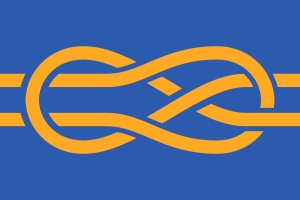Vexillology facts for kids
Vexillology (say "vek-sih-LOL-uh-jee") is the exciting study of flags! It explores their history, what their symbols mean, and how people use them. If you love flags, you're already interested in vexillology!
People who study flags are called vexillologists. If someone designs flags, they are a vexillographer, and the art of designing flags is vexillography. A person who simply enjoys flags as a hobby is a vexillophile.
Contents
What Does "Vexillology" Mean?
The word "vexillology" comes from two old languages. It combines the Latin word vexillum and the Greek word -logia. A vexillum was a special square flag carried by Roman soldiers on horseback. The Greek -logia means "the study of." So, vexillology literally means "the study of flags"!
The History of Flag Studies
Flags have been used for a very long time, since ancient civilizations. But studying flags in a serious, organized way is quite new! An American scholar named Whitney Smith came up with the word "vexillology" in 1957. He helped make it a real field of study.
Before Smith, people usually studied flags as part of heraldry. Heraldry is the study of coats of arms and family symbols. Smith wanted flags to have their own special area of study.
How Vexillology Became a Formal Study
In 1961, Whitney Smith officially launched vexillology as a field. He did this by publishing The Flag Bulletin, a magazine all about flags. Over his lifetime, Smith created many important flag groups and events. These included the first International Congress of Vexillology (ICV). He also helped start the North American Vexillological Association and the International Federation of Vexillological Associations (FIAV).
What Vexillologists Do
Vexillology involves many different subjects. It includes sociology (how people interact), history, and design. It also brings together people who work in the flag industry and those who simply love flags.
Since 1969, the International Congress of Vexillology has met every two years. These meetings are organized by the FIAV. At these congresses, experts share their research and discoveries about flags. Their presentations are later published for everyone to read.
Groups That Study Flags
The International Federation of Vexillological Associations (FIAV) is the main international group for vexillology. Think of it as the big umbrella organization for flag studies worldwide.
There are many other important groups too. Some examples include the North American Vexillological Association and the German Society for Flag Studies (called Deutsche Gesellschaft für Flaggenkunde in German). The popular website Flags of the World (FOTW) is also a key resource for flag enthusiasts.
Official Flag Experts
In Scotland, there's a special rule about flags. All Scottish flags must be approved by an official called the Lord Lyon. He makes sure they are recorded in a public register. The Lord Lyon even appointed Philip Tibbetts as an Honorary Vexillologist. This shows how important flag experts can be in official government roles!
See Also
 In Spanish: Vexilología para niños
In Spanish: Vexilología para niños
- Glossary of vexillology
- List of flags by design
- List of national flags by design
- List of vexillologists
- Vexilloid
- Vexillological symbol
- Good Flag, Bad Flag
 | John T. Biggers |
 | Thomas Blackshear |
 | Mark Bradford |
 | Beverly Buchanan |


